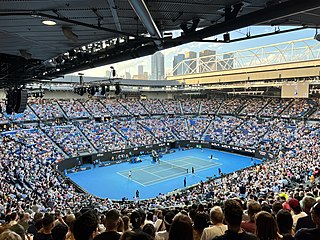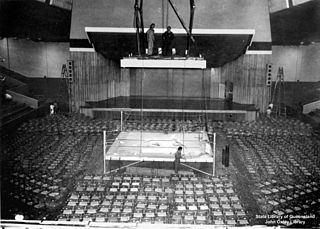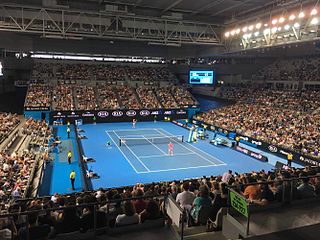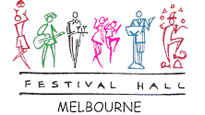
Docklands Stadium, known by naming rights sponsorship as Marvel Stadium, is a multi-purpose sports and entertainment stadium in the suburb of Docklands in Melbourne, Victoria, Australia. Construction started in October 1997 and was completed in 2000 at a cost of A$460 million. The stadium features a retractable roof and the ground level seating can be converted from oval to rectangular configuration.

Melbourne Showgrounds is located in the inner north-western suburb of Ascot Vale, Victoria, Australia, next door to Flemington Racecourse. The largest and most flexible indoor/outdoor venue space in Melbourne the Showgrounds is the home of the annual Melbourne Royal Show, as well as major exhibitions, trade shows, and music concerts, including the Supanova Pop Culture Expo, the Caravan & Camping Touring Supershow and MotoExpo.

Rod Laver Arena is a multipurpose arena located within Melbourne Park, in Melbourne, Victoria, Australia. The arena is the main venue for the Australian Open, the first Grand Slam tennis tournament of the calendar year.

Sydney Entertainment Centre, later known as Qantas Credit Union Arena, was a multi-purpose arena located in Haymarket, Sydney, Australia. It opened in May 1983, to replace Sydney Stadium, which had been demolished in 1970 to make way for the Eastern Suburbs railway line. The centre was owned by the Sydney Harbour Foreshore Authority, which administered the neighbouring Darling Harbour area, and managed under a lease.

Harringay Arena was a sporting and events venue on Green Lanes in Harringay, North London, England. Built in 1936, it lasted as a venue until 1958.

The Masonic Temple is a hall in Toronto, Ontario, Canada. It is located on the north-west corner of Davenport Road and Yonge Street.

The Sydney SuperDome is a multipurpose arena located in Sydney Olympic Park suburb of Sydney, New South Wales, Australia. It was completed in 1999 as part of the facilities for the 2000 Summer Olympics.

The Adelaide Entertainment Centre (AEC) is an indoor arena located in the South Australian capital of Adelaide. It is used for sporting and entertainment events. It is the principal venue for concerts, events and attractions for audiences between 1,000 and 11,300.

Hillsong Church, commonly known as Hillsong, is a charismatic Christian megachurch and a Christian association of churches based in Australia. The original church was established in Baulkham Hills, New South Wales, as Hills Christian Life Centre by Brian Houston and his wife, Bobbie Houston, in 1983. Hillsong was a member of the Australian Christian Churches – the Australian branch of the US-based Assemblies of God – until 2018, when it separated to form a new denomination. The church is known for its contemporary worship music, with groups such as Hillsong Worship, Hillsong United and Hillsong Young & Free with many musical credits and hits and a series of scandals and criticisms.

Hillsong Conference is a mid-year week-long annual Christian conference hosted in Sydney, Australia, with a smaller three-day event held in London later each year. It is the largest annual conference in Australia of any kind. The event is hosted by Hillsong Church at the Qudos Bank Arena and surrounding Olympic Park precinct.

The State Sports Centre is a multi-use indoor arena in Sydney, New South Wales, Australia and was opened in November 1984. With a total of 3,854 fixed and retractable seats the main arena is a focal point of the Sydney Olympic Park Sports Centre. An additional 1,152 portable seats can be accommodated on the floor level to bring seated capacity to 5,006.

The Palais Theatre, formerly known as Palais Pictures, is a historic picture palace located in St Kilda, an inner suburb of Melbourne, Victoria, Australia. With a capacity of nearly 3,000 people, it is the largest seated theatre in Australia.

Brisbane Festival Hall was an indoor arena located on the southern corner of Albert Street and Charlotte Street, Brisbane, Queensland, Australia. It operated from 1910 to 2003, before being demolished to make the Oak Festival Towers apartment building and hotel.

Perth Stadium, currently known as Optus Stadium for sponsorship reasons, is a multi-purpose stadium in Perth, Western Australia, located in the suburb of Burswood. It was completed in late 2017 and officially opened on 21 January 2018. The stadium's total capacity is 61,266, including standing room, making it the third-largest stadium in Australia. The stadium can be extended up to 65,000 seats for rectangular sports.

The Palace Theatre was an entertainment venue located in Melbourne, Australia. First built for live theatre in 1912, it was also used as a cinema and for live music. It was demolished except for its facade in 2020 after much community opposition, to be replaced by a hotel.

The No Sleep Til Festival was a music festival that was held across Australia and New Zealand in December 2010. The Festival was headlined by Megadeth, who played their album Rust in Peace in its entirety. Other bands included were NOFX, Dropkick Murphys, and Parkway Drive. It also featured punk band Descendents, playing their first Australian shows in their 31-year career.

John Cain Arena is a multi-purpose sports and entertainment arena located within Melbourne Park in Melbourne, Victoria, Australia. It is the second-largest venue and show court for the Australian Open, the first Grand Slam professional tennis tournament held each calendar year. The arena also hosts various other sporting and entertainment events throughout the year.
Stadiums Limited is an Australian company established in the late 1890s that owned and administered four venues on Australia's east coast at West Melbourne Stadium, Sydney Stadium, Leichhardt Stadium and Brisbane Festival Hall. It was founded in 1915 by John Wren and Dick Lean Senior who acted as the general manager. Incorporated in its final form in 1915, prior to this, Wren worked with Lean Senior, purchasing the various locations, including the site of what became the West Melbourne Hall, and ultimately Festival Hall from Reginald (Snowy) Baker. Stadiums initially began presenting both boxing and professional wrestling. Wren, as he did in other parts of his life, offered a great deal of money to boxers and wrestlers to perform. The operations of Stadiums Ltd changed in the second half of the 20th century, as the venues began to be predominantly used for live music and for television broadcasts. Notably, it was Dick Lean Junior as the promoter and Managing Director of Stadiums Ltd who booked the Beatles to play Australia in 1964 - arguably the most successful Concert coup in Australian entertainment history. Dick Lean became Managing Director of Stadiums, vastly increasing the Company profitability by continuing to promote and bring to Australia many of the major headline acts during the 1960s, 1970s and 1980s - all who performed in the Stadium's venues in Melbourne, Sydney and Brisbane.
Good Things is a music festival held in major cities around Australia. It features a number of international and Australian music acts, from various genres including rock, metal, punk, and emo.

The Avalon Theatre is a historic former Temperance Hall, theatre and cinema in Hobart, Tasmania, Australia.






















